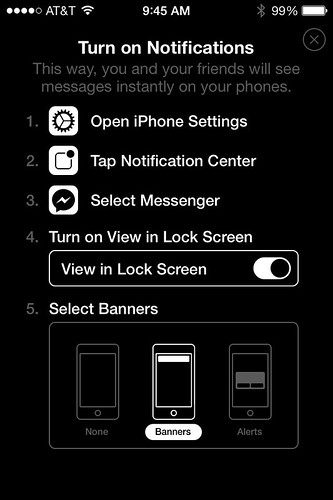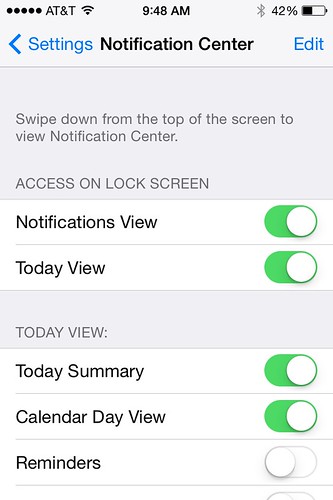In the last several posts, we saw how to adjust ringtones, text tones, and email alert tones. The idea was twofold: to give your phone a more wide-ranging voice, and to give your phone guidance about who has the right to interrupt you, and who doesn’t. Now we’ll look at another source of irritation and interruption: apps that send you updates.
Apps love to send you notifications. Some of them are kind of pushy about it (as it were).
For example, if you haven't allowed Facebook Messenger to push you notifications, every time you open it shows you a screen with step-by-step instructions to guarantee that "you and your friends will see messages instantly on your phones."
It really wants you to make this your default. The more you interact with it, the more it learns about you—where you are, when you’re messaging, who you’re messaging with.
But in addition to the powerful commercial imperative behind these designs, there’s also a deeper assumption: that connectivity ought to be the default, and that we should always be accessible, no matter what.
This is the kind of thinking that contributes to our state of perpetually-connected distraction. So it's good to fight back against it.
First, check the notifications settings of your apps. To do this, go to Settings > Notification Center. This controls what you see on the lock screen, the notifications center (the thing that appears when when you swipe down from the top of the screen), and notifications– badges, sounds, previews, etc.– from individual apps.
If you scroll down past "Access on Lock Screen" "Today View," and "Notifications View," you'll see "Include" and "Don't Include." The former is the list of apps that can send ping you, alert you to changes, etc. In effect, it's the list of apps that have permission to interrupt you.
Is the list longer than you expected? It almost certainly is, because app makers love to be on that list. They think that by shooting you lots of notifications, you'll stay more engaged with them. But do you really need that casual game sending you messages, or real-time social media updates, or news from your Internet radio app? Probably not.
So what's a more sensible set of notifications? You probably want your phone, messages, mail, and calendar to notify you; maybe Skype or some other critical communications tool deserve to be there too. Maybe even Facebook Messenger, if you and your friends use it regularly.
But beyond that, think seriously about whether an app needs to be able to reach out to you, and whether what it has to tell you is worth your attention.

